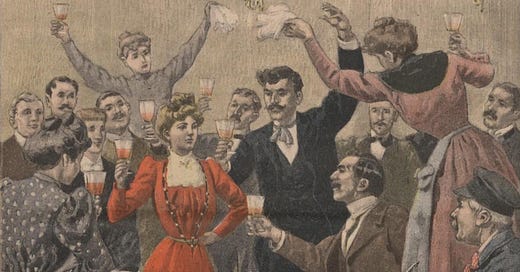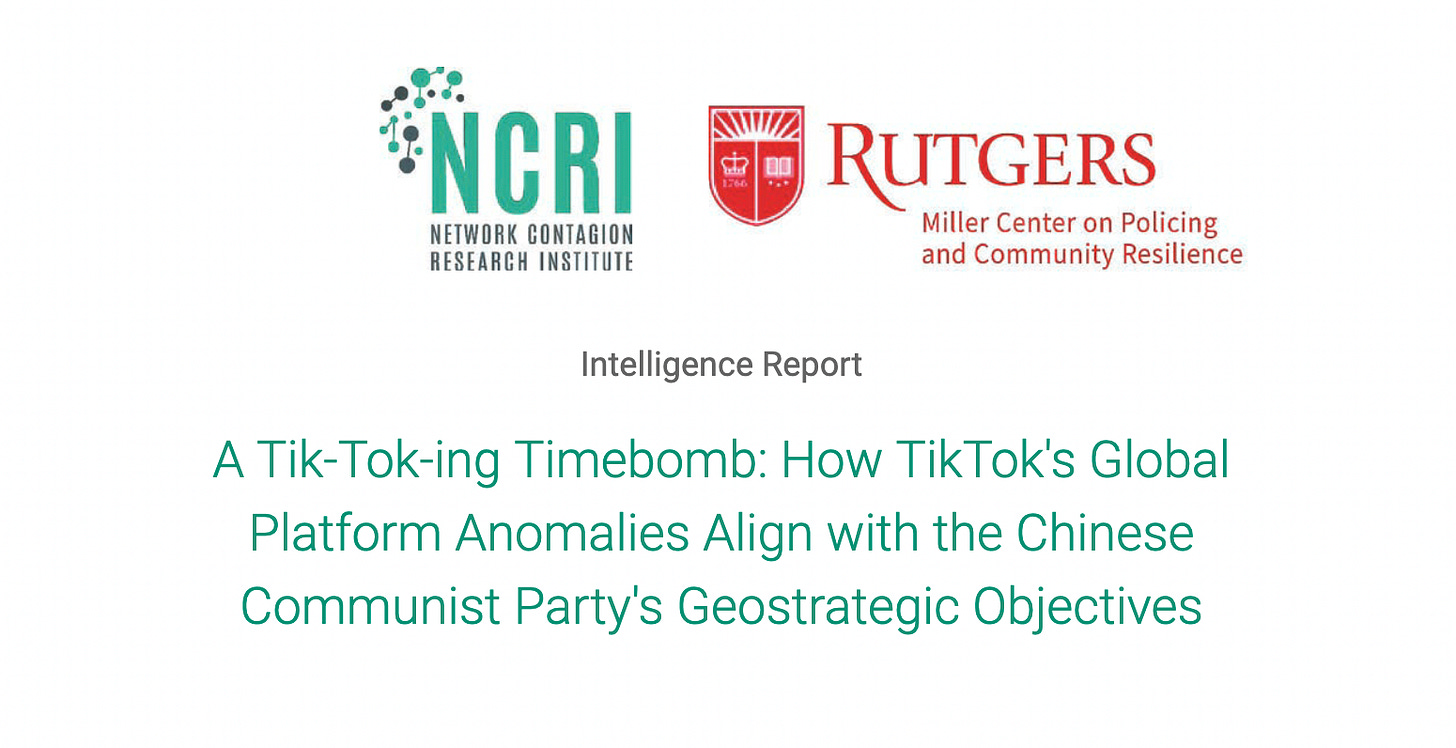Hello,
you are reading Understanding TikTok. My name is Marcus. I am an Internet researcher at HAW Hamburg, investigating TikTok. Happy New Year. Well, wait. I am not so entirely sure that 2024 will be a happy year given the current status of global politics. Globally, more voters than ever in history will head to the polls as at least 64 countries (plus the European Union)—representing a combined population of about 49% of the people in the world (Time). Here is a global election tracker.
Today we talk about:
🗳️ TikTok Elections
🔫 The Tik-Tok-ing Timebomb
🗳️ TikTok Elections – The first serious influencer election
This is the first time TikTok will be front and centre as an app for political news and views in an election year, says Katie Harbath, founder and CEO of technology policy firm Anchor Change in an interview with Al Jazeera. While the app has played a significant role in prior elections worldwide (e.g. Brazil, Philippines) we can expect TikTok to be a major place of a) political campaigning and b) foreign information manipulation & interference (FIMI) attempts.
Let’s start with the 2024 United States presidential election. As Twitter loses its most active users and with young people favoring short-form video, the role TikTok plays in elections is likely only going to get larger (The Nation). Gen Z and millennials will make up nearly half of the electorate (NPR) with Millennials and some of their younger siblings, becoming a majority of the electorate in just six years (Brookings).
Yet very few politicians, including the top candidates for president, are on TikTok (NYT): “There’s no official @POTUS, White House or Biden-Harris 2024 account. You’ll find only one of the Republican presidential candidates there — and just 37 sitting Congress members, according to a New York Times review of accounts. Today, just 7 percent of the 533 Senators and Representatives have verified accounts on TikTok, and some have never posted, according to the analysis by The Times. None are Republican.” By NPR's estimate, less than .05% of Congress has either a congressional or a campaign TikTok account that has posted within the last 30 days. No Republican from either chamber has an active, verified account on the platform (NPR). Exceptions include: Jeff Jackson, Bernie Sanders, Cory Booker, AOC, Ilhan Omar.
The strategy anyhow seems to rely on others. 2024 is shaping up as the first serious influencer election. Both parties have cultivated networks of informal spokespeople who can reach younger voters or supporters who may not see or be moved by traditional television advertising (Semafor). Rob Flaherty, Biden's Deputy Campaign Manager and previous White House director of digital strategy is pretty open about it:
"If you could tell me I had a choice between an account that was producing owned content or 100 accounts that were people saying good things about Joe Biden on TikTok I would take 100 people saying good things about Joe Biden on TikTok a million times out of a million" (NPR). The appeal of influencers to campaigns on both sides is obvious. It allows to boost message even when platforms, such as TikTok, prohibit direct political advertising. Yet we have still more than 10 months to go and currently the Biden campaign {seems to} struggles to keep young social media influencers in the fold (CNN).
🗳️ TikTok Elections – Foreign Interferences
One of the first elections to kick off the election year is Taiwan's upcoming presidential election (13 January 2024). Taiwan’s future is a flash point of heightened U.S.-China competition (FP). The election has been targeted by an influence operation spanning Facebook, TikTok and YouTube (NPR) and we will most likely see more of that. U.S. intelligence agencies released a report (NYT) on the 2022 midterm elections — a document that gives us some hints (PDF) about what might be to come with China, Russia, Iran and Cuba all trying to meddle in with advancing strategies and massive disinformation campaigns (compare #118) on a vast array of topics (EDMO).

TikTok has (SCMP) and for sure will further team up with fact checkers and promise to ensure election integrity. Yet “when election success goals and metrics are in tension with how the organization defines and measures success overall, there will be internal conflict” (Rest of World).
That is why a lot of policy papers and reports are currently produced and passed around with the 2024 European Parliament election scheduled to be held on 6 to 9 June 2024. Widespread disinformation could already be observed during the election campaigns in all European countries that held elections in 2023 (EDMO). To effectively combat disinformation ahead of the 2024 election, a comprehensive strategy is required, writes the European Policy Centre (PDF).
An impulse paper from a collaboration between the Bertelsmann Stiftung‘s Upgrade Democracy Team and the Humboldt Institute for Internet and Society (PDF) mentions that “there are a lot of players and normative layers, and influence vectors involved: social, legal, political, economic, technical. Rather, a collaborative approach is essential, with each actor embracing their roles and obligations.” Platform providers for instance could amplify trustworthy sources while civil society could provide media and digital literacy training. Journalist Enrique Anarte for example has started a little series on TikTok to inform about the European Parliament elections while the European Parliament has banned TikTok from staff phones in February 2023 (Reuters) with some MEPs clinging to TikTok for Gen Z votes (Politico).
🔫 The Tik-Tok-ing Timebomb
A report from the Network Contagion Research Institute (PDF) says that TikTok likely promotes and demotes certain topics based on the perceived preferences of the Chinese government (NBC). It was widely covered by many major news organizations including NYT, Insider, Newsweek in late December 2023.
Yet “the authors of the study made two remarkably basic errors that call into question the fundamental utility of the report” writes Paul Matzko, a research fellow at the Cato Institute on his Substack: “First, the authors chose a flawed methodology that failed to account for how long each platform has existed. Second, the authors assumed that the same people use both platforms, which led them to miss the potential for generational cohort effects”. He suggests “that this particular study is poorly designed and should not be used as evidence of algorithmic manipulation by TikTok.” TikTok had made similar points after the NCRI publication yet Matzko’s explanation and Tibet example adds more.
Another question i am asking myself: Where exactly did the researchers get the absolute numbers for TikTok posts by hashtag? “By using the platform’s own ads manager portal” it says in the NCRI report. Excuse my poor knowledge of the ads manager but can you point me to the place where this is possible for any given hashtag and for the entire period of time since TikTok started? 🤔 I wrote to NCRI and asked for clarification but have not yet heard back from them.
🏹 One-third
One-third of videos viewed on TikTok do not have any hashtags. Comparing hashtags is an inaccurate reflection of on-platform activity, TikTok says (NYT).
🎡 What else
TikTok moderators struggling to assess Israel-Gaza content (Guardian)
Diary of a TikTok moderator: ‘We are the people who sweep up the mess’ (Guardian)
How platforms shaped our understanding of Israel-Hamas (Atlantic Council)
Indonesia: Presidential candidates venture into TikTok (The Star)
The Lonely Teens on TikTok (The Cut)
What is North Sea TikTok (Bustle)
Thanks for reading. Speak soon. Ciao.





